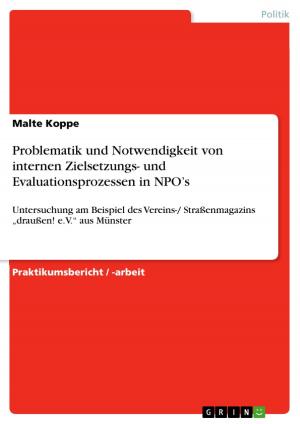Critical evaluation of different approaches to coaching
Nonfiction, Reference & Language, Education & Teaching| Author: | Bruno Rihs | ISBN: | 9783638006842 |
| Publisher: | GRIN Verlag | Publication: | February 19, 2008 |
| Imprint: | GRIN Verlag | Language: | English |
| Author: | Bruno Rihs |
| ISBN: | 9783638006842 |
| Publisher: | GRIN Verlag |
| Publication: | February 19, 2008 |
| Imprint: | GRIN Verlag |
| Language: | English |
Seminar paper from the year 2007 in the subject Pedagogy - Science, Theory, Anthropology, University of Sheffield (Faculty of Organisation and Management), 27 entries in the bibliography, language: English, abstract: In this assignment, I would like to reflect on and develop an understanding of different approaches to coaching and subsequently try to compare these approaches among themselves for the purpose of evaluation. Which approach helps the best to reach a specific goal? Money and time being a constraint in almost all situations, it is reasonable to look for evidence concerning best practices. Human mind is known to get influenced quite easily by what it is subjected to. For instance, if we look at a description of one approach, we easily get the impression that this is the best and the most effective one. All the same, if we read about another approach, we might believe that the other one is an even better option. Debates like these are an ongoing process in various fields. In the field of teaching for example there has been a long lasting debate about which method is the best. Is it the instructional approach or the group work style or else the open space approach? In therapy, similar questions are asked between different schools. Each one claims to be the best and every one can prove it with case studies or sometimes with empirical pieces of research. What works? Many different models of thought have been developed on many different roots and theories. Depending on the underpinning anthropology we find different approaches to the interpretation of coaching. Some emphasize a more rational approach, we could call it the Head-level, some the level of feelings and others focus on Intuition. Alike the three dimensions in space (length, breadth, height) there is a need of all three. If one is completely missing, the result is nill. With the tendency to measure and to analyse all appearances in the world (coaching included) we always react on the surface of the world. We are in danger to neglect the immeasurable aspects like feelings, attitudes and values, culture and norms. Different and contrasting perceptions of the reality are possible and correct. The either-or mentality is no longer valid and must be replaced by the 'as well as' approach. Between the sky and the earth there exist unexplainable things of which we probably will never know how they work. Nevertheless we can use different approaches.
Seminar paper from the year 2007 in the subject Pedagogy - Science, Theory, Anthropology, University of Sheffield (Faculty of Organisation and Management), 27 entries in the bibliography, language: English, abstract: In this assignment, I would like to reflect on and develop an understanding of different approaches to coaching and subsequently try to compare these approaches among themselves for the purpose of evaluation. Which approach helps the best to reach a specific goal? Money and time being a constraint in almost all situations, it is reasonable to look for evidence concerning best practices. Human mind is known to get influenced quite easily by what it is subjected to. For instance, if we look at a description of one approach, we easily get the impression that this is the best and the most effective one. All the same, if we read about another approach, we might believe that the other one is an even better option. Debates like these are an ongoing process in various fields. In the field of teaching for example there has been a long lasting debate about which method is the best. Is it the instructional approach or the group work style or else the open space approach? In therapy, similar questions are asked between different schools. Each one claims to be the best and every one can prove it with case studies or sometimes with empirical pieces of research. What works? Many different models of thought have been developed on many different roots and theories. Depending on the underpinning anthropology we find different approaches to the interpretation of coaching. Some emphasize a more rational approach, we could call it the Head-level, some the level of feelings and others focus on Intuition. Alike the three dimensions in space (length, breadth, height) there is a need of all three. If one is completely missing, the result is nill. With the tendency to measure and to analyse all appearances in the world (coaching included) we always react on the surface of the world. We are in danger to neglect the immeasurable aspects like feelings, attitudes and values, culture and norms. Different and contrasting perceptions of the reality are possible and correct. The either-or mentality is no longer valid and must be replaced by the 'as well as' approach. Between the sky and the earth there exist unexplainable things of which we probably will never know how they work. Nevertheless we can use different approaches.















